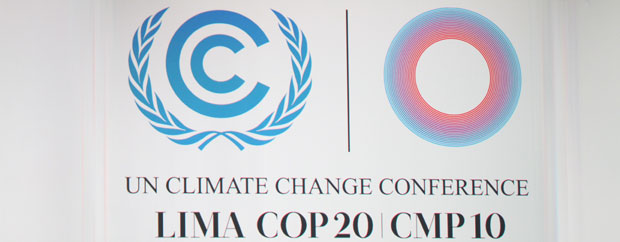
December 2014 - The key decision to emerge from the climate summit lays the basis for negotiations on the new global climate change agreement. Only after lengthy consultation was the Peruvian COP President able in the final phase of the conference to present a compromise that was acceptable to all Parties. The ‘Like-Minded Developing Countries’ (a group including China, India and Arab states) took a tough stance in that final phase to stymie decisions that moved away from the ‘firewall’ separating developed and developing countries. The wording agreed in the end represents an initial crack in the firewall.
The Lima Call for Climate Action firstly incorporates elements for a draft negotiating text. These bring together the options on key issues and will serve as the basis for specific negotiations on wording in 2015. Secondly, the Parties adopted decisions on ‘intended nationally determined contributions’ (INDCs) for the new agreement. INDCs provide a means for Parties to indicate the emission reduction contributions they are able to make.
The Parties also reached decisions on enhancing climate change ambition prior to 2020 and for the implementation of existing decisions. During the summit, funds in excess of US$10 million were mobilised for initial capitalisation of the Green Climate Fund (GCF). With pledges from Indonesia, Colombia, Mexico, Mongolia, Panama, Peru and South Korea, developing countries are to contribute to climate financing for the first time. This is remarkable with a view to the firewall and sends out an important signal for Paris 2015. Germany has pledged some €55 million for the Adaptation Fund and in doing so has provided important trust-building impetus for developing countries.
As expected, it will not be possible to resolve the differences that came to light concerning central issues of the new agreement until the Paris summit. But there were clear signs of willingness among the Parties to work towards a new agreement that does justice to the challenges of climate change. This will also be aided by the Lima-Paris Action Agenda called into being by the hosts of the two climate summits, Peru and France, under which the two countries will organise support for the new climate change agreement and contribute to increasing ambition prior to 2020. In a similar vein, the Nazca Climate Action Portal launched by the Peruvian government is designed to mobilise non-governmental activities and thus create additional momentum for Paris. The Parties will continue their negotiations in Geneva in February 2015.
The document setting the stage for the Paris conference gives greater prominence than previously expected to the role of markets. Markets are given direct mention in many places, sometimes in alternative options but on the whole in a manner such that the use of markets stands a strong chance of inclusion in the Paris agreement. The decision text also addresses important qualitative features of the future mechanisms, including with regard to accounting, environmental integrity, and linkage with national mitigation contributions. There is now a clear de facto mandate for the negotiations ahead.
Nonetheless, the climate change negotiations will not be able to move straight on to the design of the mechanisms. Many aspects of the new climate change agreement need to be known before the role of the mechanisms can be lastingly decided. The gap between adoption and entry into force of the Paris Protocol leaves enough time for structuring the mechanisms and, as when the CDM was introduced, for trialling them on a pilot basis.
In the lead up to Paris, it would be desirable for the Parties to reach consensus on two sub-issues: firstly, it is necessary to develop the basic outline of the modalities and procedures so that pilot projects can be implemented. Secondly, at minimum, the working program for the mechanisms needs to be developed to an extent that only the COP decision is left to be adopted in Paris.
Cookie Settings
Marketing-Cookies werden von Drittanbietern oder Publishern verwendet, um personalisierte Werbung anzuzeigen. Sie tun dies, indem sie Besucher über Websites hinweg verfolgen.
Provider:
Statistik Cookies
Statistik-Cookies dienen der Analyse und helfen uns dabei zu verstehen, wie Besucher mit unserer Website interagieren, indem Informationen anonymisiert gesammelt werden. Auf Basis dieser Informationen können wir unsere Website für Sie weiter verbessern und optimieren.
Provider:
Erforderliche Cookies
Erforderliche Cookies sind für den reibungslosen Betrieb der Website zuständig, indem sie Kernfunktionalitäten ermöglichen, ohne die unsere Website nicht richtig funktioniert. Diese Cookies können nur über Ihre Browser-Einstellungen deaktiviert werden.
Provider: